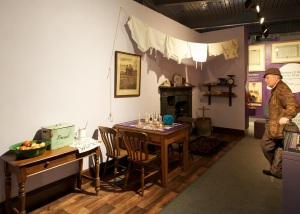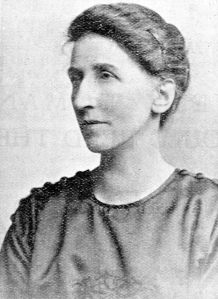A song about Hannah Mitchell
Leave a commentDecember 2, 2016 by Matt Hill Songwriter
Hannah Mitchell (b.1872- d.1956)
In gallery one of the museum is a mock up of a kitchen that belonged to a woman called Hannah Mitchell. Hannah was a socialist, a suffragist, a suffragette, a councillor, a parent. She was one of those “ordinary” working class women who are anything but. I sometimes sat at the table in Hannah’s kitchen and wrote notes. So much of the Suffragette story focuses on the Pankhursts and whilst Hannah was associated with them she was clearly a different class and a different kind of campaigner. I wanted to know a bit more about her.
 Hannah wrote an autobiography called The Hard Way Up: the Autobiography of a Suffragette and Rebel. It was never published in her lifetime but after her death her grandson found the manuscript and got it published. It’s a brilliant read and Hannah’s voice came through loud and clear.
Hannah wrote an autobiography called The Hard Way Up: the Autobiography of a Suffragette and Rebel. It was never published in her lifetime but after her death her grandson found the manuscript and got it published. It’s a brilliant read and Hannah’s voice came through loud and clear.
I found out that Hannah lived much of her life local to me. She grew up not far from where I live in Glossop and lived much of her life in Ashton-Under-Lyne, a place I also have strong links to. This geography became the immediate creative hook around which I built the song.
The hard way up
Hannah was born and grew up just off the Snake Pass road a few miles from Glossop in Derbyshire – a harsh and isolated environment, and in the book she describes a difficult childhood and eventually running away from home and heading to Glossop.The route she would’ve took is a walk I’ve done a few times and it is a hard and harsh climb. I took her climb and struggle as a metaphor for her battles within the women’s movement.
And all I knew was how harsh the winds could blow
As I climbed that hill, I knew which way to go
This is an extract from Hannah’s book The Hard Way Up: the Autobiography of a Suffragette and Rebel
“I tramped over the hill, hardly conscious of the distance, blinded by tears and full of grief at leaving my father and uncle, and the two younger children who were both very fond of me. I knew now that I must rely on myself. I knew also that I was ill-equipped for the battle of life, uneducated, untrained, what should I find myself capable of doing among more fortunate youth? These were bitter reflections and did not tend to soften my feelings towards my mother, although I felt a faint sense of relief in the knowledge that I was free from her scolding tongue and violent temper. But somewhere on the moorland road I left my childhood behind.”
The Clarion called
Hannah was inspired by the Clarion newspaper and the young socialists she met on outings and eventually began campaigning for women’s votes. She was part of a tactic of attending public political meetings and calling out questions about votes for women. Invariably the women were physically removed from meetings and arrested by police. After one such event Hannah spent a night in Strangeways Prison. Her husband paid her bail and Hannah was furious that he’d done so, she wanted to stay and show solidarity with her fellow prisoners.
 In her book Hannah describes terrible abuse she faced when speaking at public meetings (where she would often be called to deputise for an absent Mrs Pankhurst). She would face organised gangs of men who came solely to cause trouble, shouting threats of violence and often assualting her.
In her book Hannah describes terrible abuse she faced when speaking at public meetings (where she would often be called to deputise for an absent Mrs Pankhurst). She would face organised gangs of men who came solely to cause trouble, shouting threats of violence and often assualting her.
Throughout all this Hannah also faced the daily grind of a working class woman, she had to clean, cook, do laundry and look after her kids. She saw the domsetic chores of women as something that held them back, and something she hated with a passion. In her book she wrote “No cause can be won between dinner and tea, and most of us who were married had to work with one hand tied behind us.”
Shredded my nerves
In 1907 at the height of the suffragette campaign Hannah suffered a nervous breakdown. The Pankhursts, who she had loyally served, never sent so much as a get well card. Hannah was dropped and never heard from them again. She was hurt by this and in her book described herself as a soldier fallen on a battlefield and left behind. During World War One she campaigned for conscientious objectors as her son was one. Later in life Hannah became a Labour Councillor for Ashton-Under-Lyne and a Magistrate. In her book she reflects back on the women’s suffrage fight and the women she fought alongside.
“It seems to me now, looking back, that all my previous life had been a preparation for this great experience. While indirectly it caused me much sorrow, it brought me many contacts which have immeasurably enriched my life. Through the suffrage movement I have come to know many notable women who honoured me by their friendship and encouragment.
In the song I have tried to capture a few fragments of her rich life and tie them together in terms of her struggle and the harsh environment she faced. I’ve also tried to capture her sense of determination by coming back to that 14 year old girl walking up the Snake pass to Glossop. I think Tracey Browne captures that beautifully in her vocal on this song. My fellow producer Mike Harries opted to keep the music and arrangement very sparse and simple, in order to allow the voice to shine through – both Tracey’s and Hannah’s.
Here is Tracey singing ‘Hannah’ in the museum’s engine hall.
This song is featured on the album ‘ Battle for the Ballot ‘ available here
Lyrics
I loved my brother, I loved him so.
But it was hard to watch him go to school.
When I couldn’t go to school.
With my head in a book, doing chores every day
But still no education for a farmers girl like me
So I ran away, I ran away
And all I knew was how harsh the winds could blow
As I climbed that hill, I knew which way to go
Change was coming, the Clarion had called
So I joined my sisters in the Free Trade Hall
and we shouted out, til they dragged us out
Spreading the message, I stood before a crowd
and out would come this voice, that was strong and loud
and it was mine, that voice was mine
And all I knew was how harsh the winds could blow
As I climbed that hill, I knew which way to go
Must a woman’s life be spent with one hand tied behind her all the time?
The battles I fought were savage and hard
Shredded my nerves and they broke my heart
But I had to fight, we had to fight
And all I knew was how harsh the winds could blow
As I climbed that hill, I knew which way to go



